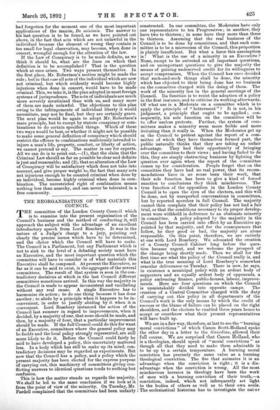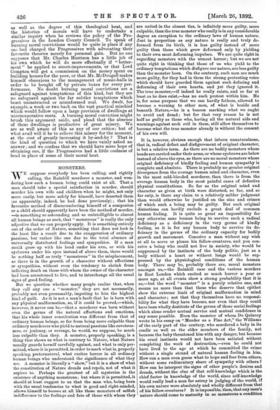THE REORGANISATION OF THE COUNTY COUNCIL. T HE committee of the
London County Council which is to examine into the present organisation of the Council's business and the method of conducting it, will approach the subject with the advantage of an excellent introductory speech from Lord Rosebery. It was in the nature of a Judge's charge to a jury, pointing out clearly the precise issues which have to be determined, and the choice which the Council will have to make. The Council is a Parliament, but any Parliament which is and the choice which the Council will have to make. The Council is a Parliament, but any Parliament which is not to sink to the level of a debating society must have an Executive, and the most important question which the committee will have to consider is of what materials this Executive shall be composed. At present the Executive, so far as it can be said to exist, is the aggregate of the several committees. The result of that system is seen in the con- tradictory decisions at which in the last Council different committees sometimes arrived. In this way the majority in the Council is made to appear inconsistent and vacillating without any real cause. A single Executive has to harmonise its action ; to do one thing because it has done another ; to abide by a principle when it happens to be in- convenient, in order to justify abiding by it when it is convenient. Lord Rosebery instanced the action of the Council last summer in regard to improvements, when it decided, by a majority of one, that none should be made, and then, by a majority of four, that a particular improvement should be made. If the full Council could do this for want of an Executive, committees where the general policy may be feebly and the local policy strongly represented, are still more likely to do it. Before the Council could fairly be said to have developed a policy, this uncertainty mattered less. In a body which has still to make up its mind, con- tradictory decisions may be regarded as experiments. But now that the Council has a policy, and a policy which the present majority has been elected for the express purpose of carrying out, this machinery of committees giving con- flicting answers to identical questions tends to nothing but confusion.
This is how the matter stands as regards the majority. We shall be led to the same conclusion if we look at it from the point of view of the minority. On Tuesday, Mr. Fardell complained that the committees had been unfairly constructed. In one committee, the Moderates have only one representative to ten Progressives ; in another, they have two to thirteen ; in none have they more than three to thirteen. Assuming that the real business of the Council is to be done by committees, and that each com- mittee is to be a microcosm of the Council, this proportion is plainly insufficient. But what a farce this assumption is ! What is the use of a minority in an Executive ? None, except to be outvoted on all important questions, and on unimportant questions to give the majority the means of gaining undeserved credit for its willingness to accept compromises. When the Council has once decided that such-and-such things shall be done, the minority which has objected to their being done has no business on the committee charged with the doing of them. The work of the minority lies in the general meetings of the Council. Its function is to resist the adoption of a policy in the first instance, and to criticise its working afterwards. Of what use is a Moderate on a committee which is to apply the principle of " betterment " ? It is not, in his judgment, a principle that ought to be applied ; con- sequently, his sole function on the committee will be to offer useless protests. Further, the system of com- mittees makes a minority seem more feeble and more irritating than it really is. When the Moderates get up in the Council to protest against the report of a com- mittee of which they have themselves formed part, the public naturally thinks that they are taking an unfair advantage. They had their opportunity of bringing over the committee to their views ; and having failed to do this, they are simply obstructing business by fighting the question over again when the report of the committee comes up for consideration. People forget that on the committee they have had no real power, that its recom- mendations have in no sense been their work, that their sole function has been to give a kind of forced sanction to conclusions they think mischievous. The true function of the opposition in the London County Council is to open the eyes of the electors, and this will be done, not by unreported conversations in committees, but by reported speeches in full Council. The majority cannot then complain that their policy has not had a fair trial, or that the conditions necessary to its proper develop- ment were withheld in deference to an obstinate minority in committee. A policy adopted by the majority in the Council has been carried into effect by an Executive ap- pointed by that majority, and for the consequences that follow, be they good or bad, the majority are alone responsible. On this point, therefore, we are entirely at one with Lord Rosebery. We advocated the creation of a County Council Cabinet long before the ques- tion became urgent, and we welcome the prospect of the change being shortly made. Then we shall for the first time see what the policy of the Council really is, and what is the true meaning of Lord Rosebery's somewhat oracular deliverance on Tuesday. There is now, he says, in existence a municipal policy with an ardent body of supporters and an equally ardent body of opponents, a policy embracing finance, public-houses, labour, improve- ments. Here are four questions on which the Council is unmistakably divided into opposite camps. The creation of a Central Committee charged with the duty of carrying out this policy in all departments of the Council's work is the only means by which the credit of success or the blame of failure can be placed on the right shoulders, and the electors be enabled three years hence to accept or overthrow what their present representatives will have built up.
We are in a fairway, therefore, at last to see the "burning moral convictions" of which Canon Scott-Holland spoke the other day in a letter to the Guardian, allowed their full course. We are surprised that Canon Holland, who is a theologian, should speak of "moral convictions" as though all that they need to make them admirable is to be up to a certain temperature. A burning moral conviction has precisely the same value as a burning theological conviction. The fire that animates it is an advantage when the conviction is right ; it is a dis- advantage when the conviction is wrong. All the most mischievous heresies in theology have been the work of men with a burning conviction of their truth,—a conviction, indeed, which not infrequently set light to the bodies of others as well as to their own souls. The ecclesiastical historian has to investigate the natur as well as the degree of this theological heat, and the historian of morals will have to undertake a similar inquiry when he reviews the policy of the Pro- gressives in the London County Council. To speak of burning moral convictions would be quite in place if any one had charged the Progressives with advocating their favourite theories merely for personal gain. But no one supposes that Mr. Charles Harrison has a little job of his own which he will do more effectually if " better- ment " be applied to street-improvements, or that Lord Compton will get a commission on the money spent on building houses for the poor, or that Mr. McDougall makes himself obnoxious to the management of music-halls in order to be bought off by private boxes for every per- formance. No doubt burning moral convictions are a safeguard against temptakons of this kind, but they are no safeguard against the far subtler temptations which beset uninstructed or misinformed zeal. We dwelt, for example, a week or two back on the vast practical mischief which would follow upon a large provision of dwellings at tunemunerative rents. A burning moral conviction might brush this argument aside, and plead that the absence of these dwellings is productive of great misery. We are as well aware of this as any of our critics; but of what avail will it be to relieve this misery for the moment, at the cost of greatly increasing it by-and-by ? That is the kind of question to which we have vainly asked an answer; and we confess that we should have more hope of obtaining one, if the Progressives had a little coolness of head in place of some of their moral heat.



































 Previous page
Previous page